#queer cinema syllabus
Text
Bengiyo's Queer Cinema Syllabus
I am currently working my way through Unit 4: Heartbreak Alley, the totally light-hearted, definitely not agonizing section of @bengiyo's queer cinema syllabus where I get to watch countless acts of violence be committed against queer people. Thank fuck I have Lesbians waiting for me at the end of this unit. The films in Unit 4 are: Bent (1997), Strange Fruit (2004),Boys Don’t Cry (1999), Brokeback Mountain (2005), Parting Glances (1986), Philadelphia (1993), The Living End (1992), Holding the Man (2015), Jeffery (1995), and Boys on the Side (1995).
Today i will be talking about
Philadelphia (1993) dir. Jonathan Demme

[Run Time: 2:05, Available on: YouTube for rent, Google Play, Amazon, Lang: English]
Summary: When a man with HIV is fired by his law firm because of his condition, he hires a homophobic small time lawyer as the only willing advocate for a wrongful dismissal suit.
Cast:
* Tom Hanks as Andrew Beckett
* Denzel Washington as Joe Miller
* Antonio Banderas as Miguel
___
To steal a comment from @lurkingshan, it has been awhile since I’ve watched a good legal thriller. Philadelphia is brilliant, and I don’t just mean in the general sense, I mean it is smart. It is smart in how it sets itself up. We start with Andy and Joe on opposites sides of a court room, we can see the rapport between them, but we set them up on opposite sides from the beginning. We move from there to Andy at the hospital, receiving his transfusions, looking across the way to a man whose karposi’s sarcoma has advanced to the end stages a look to where Andy himself will end in this film. And then to Andy’s law office where there is physical touch, after physical touch, after physical touch. Some that happen so quickly, others that linger, that the camera focuses in on, and I only wish that we’d seen Andy the day after that meeting, because I would be curious to see if and how the physical touches changed with people in the office.
But that’s not what we get, and we don’t really need it because what is truly important is that Andy is sicker than he originally let on. The point is that the law firm set Andy up while he was away. The point is that at so many stages in this film I was mad. And that was how I was supposed to be. I was mad at all the homophobic pieces of shit that were sitting there making excuses, that based a significant portion of their legal argument about not discriminating against Andy because he was gay with HIV, by trying to discredit Andy’s character because he was gay. [and of course the law office used a woman as their representation and had a Black man at their table as well…you know they were really trying to look good]
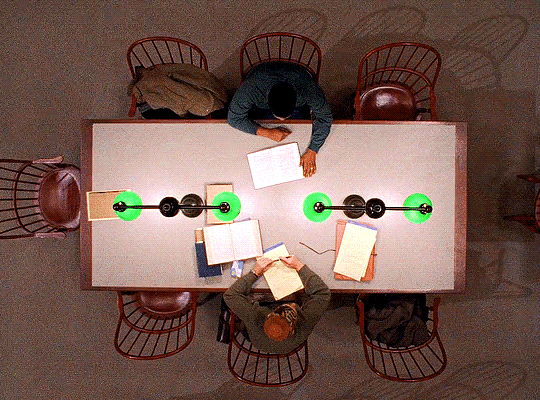
gif by @rancidtofu
You might know by now that I love a complicated relationship, so I was really thrilled that Joe eventually decided to represent Andy. Because Joe was homophobic as fuck, and he very much did not want to take the case. But again this film is smart, we never have to hear from Joe’s mouth or anyone’s for that matter that Joe decided to work with Andy after seeing how he was being treated by the librarian, but we know there’s no way it isn’t informed by experiences of racism in Black communities. The way Joe was stared at by a library worker when he was sitting at his table, the way Andy was stared at by a library worker when he was sitting at his table. The way Andy was being suggestively ushered away to somewhere out of view to other library patrons.
I loved that Joe was viciously homophobic because it demonstrates so well the boundary between work and personal life. Joe is able to do his job and do it well, and eventually after months of working with Andy, is able to come around, even touching Andy’s face which we know even has a lesion on it, by the end of the film. That is huge from someone that started the film literally running immediately to the doctor to make sure he didn’t have AIDS from shaking Andy’s hand. From a modern lens I can totally see how that would probably feel stereotypical or derivative or something like that but I think it is important to keep in mind that this film was one of the first Hollywood movies to feature HIV/AIDS and also portray gay people in a positive light. I haven’t actually been adding the for/by/about designations to the Heartbreak Alley films because something about doing that didn’t really sit right to me when we’re discussing the violence to and death of queer people. But this film definitely was not made for queer people, and Tom Hanks acknowledges that he was cast in the role for his “non-intimidating screen persona” and that “one of the reasons people weren’t afraid of this movie was because I was playing a gay man.”
The casting here was strategic to further assist audiences in sympathizing with a gay, HIV positive character.
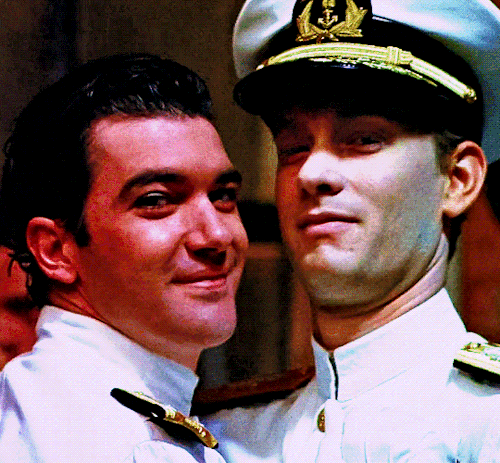
gif by @rancidtofu
I really love all the little moments of solidarity, the smiles between the Black secretary at the law office and Joe because They Know™ about experiences of discrimination in the workplace. The solidarity between the secretary with AIDS and Andy. I loved that a Black woman was teaching Andy how to apply make up to cover his lesions. I loved that Andy’s entire family knew that he was gay, knew he had AIDS, knew he had a partner and that they all loved and accepted him, and that he had so many people in his life that truly, well, and deeply cared for him.
And I love how that is used to deliver maximum emotional impact, at least to me, in one single stupid opera line.
I genuinely enjoyed essentially sitting in a court room for two hours watching Joe strategize, and execute his traps for the jury to win them over. I love how you know that they have won the second that a juror repeats verbatim a line Joe had said repeatedly throughout the trial. I am grateful the film was kind enough to let Andy be awake and alert enough to know that they had won. That his one of his last acts on earth was getting to engage with the part of law he loved most: “that every once in awhile, not often, but occasionally, you get to play a part in justice being done” Justice was done here, Joe and Andy both played a role in what could potentially become another precedented case in the roster to build towards a stronger future for gay people in the workplace. I think that (though likely coupled with how much his body was beginning to fail) is what finally made him ready to go. Because for so much of this film he would hesitate when it came to death.

gif by @rancidtofu
He froze over the line “the actual physical [death]” when quoting the line about AIDS causing a social death. He talked about planning his memorial to try to get a reaction out of Miguel, and when Miguel gave him a response he very much did not want to hear “maybe you should” he took Miguel to a party, he talked about opera instead of practicing his Q&A.
I am grateful the film ends at his memorial, not just for the memories, though I am especially glad it ends on a video of Andy as a child (to appeal to the ‘he was somebody’s kid type of crowd) but that the memorial was not entirely gloomy. There was life, there was conversation, there were smiles, it made things feel more real. Just like all “see you tomorrow” lies everyone knew they were telling themselves felt real.
Tom Hanks and Denzel Washington are such powerhouses of actors and I am so so grateful that they did this project together.
Favorite Scene
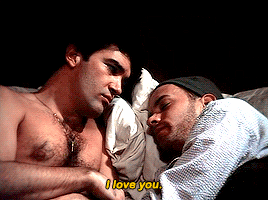
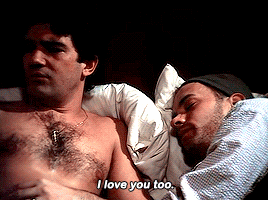
(I am acknowledging that these gifs by @antoniosbanderas have nothing to do with my listed favorite scene, but I just need you all to know that the scene of these two laying in bed was cut from the final edit of the film, so I didn't actually get to watch it, so now you know it exists if you didn't already)
My favorite scene is when the law firm is questioning Melissa Benedict, a secretary that used to work with one of the lawyers in his previous firm. Melissa was diagnosed with AIDS after a blood transfusion, and she was put on the stand to prove one of the lawyers knew what AIDS lesions looked like and therefore was able to identify that Andy had HIV a week before he was fired.
I was ready to reach through my screen to smack a bitch when the law firm’s representation started trying to make a moral argument, that Melissa’s AIDS was acceptable AIDS to have in an office because she involuntarily contracted the disease through a medical procedure, whereas Andy had had gay sex and therefore voluntarily risked acquiring HIV. And you can just see Melissa looking over at Andy so often when the law firm is trying to make this argument, and trying to get Melissa to answer questions in a way that would make her seem like she is actually of the law firm’s opinion.
And she doesn’t let them do that to Andy. Instead she looks right at him and she qualifies her response saying: “But I don’t consider myself any different from anyone else with this disease. I’m not guilty, I’m not innocent, I’m just trying to survive” and it is just a beautiful moment for me. Especially because this film is trying to portray queer people in a positive light, having a straight, white woman with a disease she had no way of preventing say that she was just like anyone else with AIDS is hugely important to driving that message home.
Favorite Quote
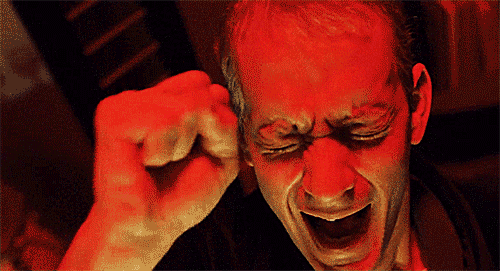
gif by @fran-kubelik
I am so sorry in advance for how long this quote is, and that 90% of it is technically just Andy translating an opera but:
“‘Look the place that cradled me is burning.’ Do you hear the heartache in her voice? Can you feel it Joe? Now in come the strings and it changes everything. It’s like the music, it fills with a hope. And that’ll change again. Listen. Listen. “I bring sorrow to those who love me” oh oh that single cello. “It was during this sorrow that love came to me.” (sobbing) “A voice filled with harmony. It said, live still. I am life. Heaven is in your eyes. It’s everything around you. It’s the blood and the mud. I am divine! I am oblivion. I am the god that comes down from the heavens to the earth and makes of the earth a heaven. I am love. I am love.”
The level of emotion, the implication behind each and every line that he translates, the way that those lines spoke to me as a queer person. “Look the place that cradled me is burning” this body, his body is failing; this life, his life is coming to an end. “I bring sorrow to those who love me” we see that with Andy’s mom, with his entire family for that matter, we see how loved he was and know that his death is going to be a devastating blow for a lot of people. “It was during sorrow love came to me” Miguel is there for all of it, through all of it. When he collapses in court, his family is the first to get to him, to try to help him. When he’s in the hospital the entire hallway is flooded with people that love him. Andy breaks at this point in his monologue, choking out the line “A voice filled with harmony. It said, live still. I am life. Heaven is in your eyes. It’s everything around you. It’s the blood and the mud.” I do not think Andy was ready to go until the very end when he finally said he was. Live still. Andy wants to live still. I am life. Heaven is in your eyes. It’s everything around you. It’s the blood and the mud. He will see Heaven soon, he is looking at the world through the lens of a dying man. “I am the god that comes down from the heavens to the earth and makes of the earth a heaven” We have one life to live, we should use it well, Andy has so much love in his life, that’s truly such a heavenly thing to have. He is seeking justice, in such a way that others might be protected the way he wasn’t. “I am love. I am love.”
I just.
I don’t know y’all I just really liked this film.
Score
9.5/10
I’m salty that Denzel wasn’t nominated for an Oscar, though I am wholly unsurprised, and I am glad Tom Hanks won and that his speech included praise of Denzel.
““And an actor who put his film image at risk and shown because of his integrity, Mr. Denzel Washington who I very much share this with”
Lovely film, highly recommend.
Now on to The Living End
#bengiyo queer cinema syllabus#queer cinema syllabus#unit 4: heartbreak alley#philadelphia#philadelphia (1993)#denzel washington#tom hanks#antonio banderas#and with this film I am now 60% of the way through Unit 4#I can see the finish line
55 notes
·
View notes
Note
If you had to pick one film that was your favorite from each unit of your Queer Cinema Syllabus, which ones would they be and why?
The Queer Cinema Syllabus grew out of a conversation that @shortpplfedup and I were having about what queer works I would show to a prospective BL fan, which eventually led to the creation of @the-conversation-pod. Captain Hands here has decided to run the gauntlet and has reached Unit 2.
Unit 1: Coming of Age Post-Moonlight
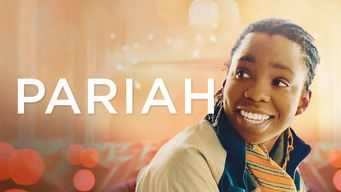
It's definitely Pariah (2011). This movie and Moonlight (2016) are having a complex conversation about Blackness and Queerness that feels so resonant to me. It's so rare that we see lesbians of any sort treated with this much complexity and sympathy in a contemporary setting. The complex web of lesbian interactions here isn't matched that often, and the only other movie that comes to mind it The Watermelon Woman (1996).
Unit 2: Race, Disability, and Class
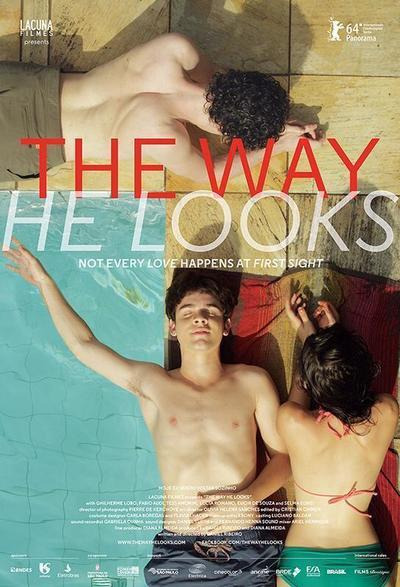
Probably The Way He Looks (2014) because it's an easy layup to introduce folks to the genre. The intersection between Leo's blindness and his queerness gives the newer person multiple things to think about and forces them to consider how queer people are more than just their queerness. I also feel warmly about this film because it was a project we followed all the way from short film to movie, and I love that we were able to get the entire cast back.
Unit 3: Faith and Religion
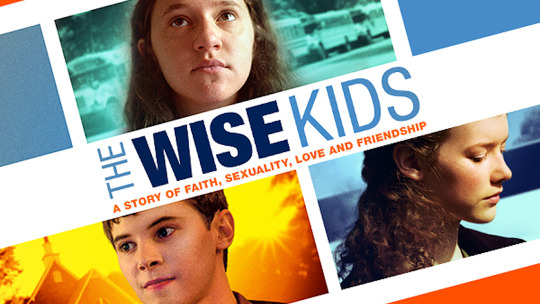
You haven't gotten here, but this is where things start to get especially heavy. I think for this section I'm going with The Wise Kids (2011) because I really like the way Stephen Cone approaches the struggle with faith queer and non-queer people have in evangelical spaces. There's an honesty that I really admire. This is not an easy film, but it's lingered with me for over a decade.
Unit 4: Heartbreak Alley
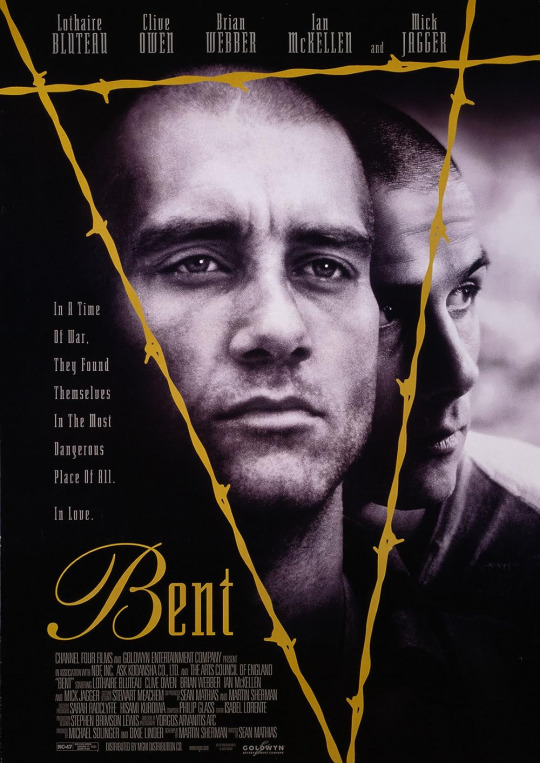
This is the section of straight losses. I don't know that I ever want to watch it again, but I would probably select Bent (1997) as my favorite because the idea that we could still love even in the greatest of horrors spoke to me. I also think the performances in this adaptation are phenomenal.
Unit 5: Lesbians

I think we just passed Lesbian Visibility Day, so happy birthday, lesbians! This is actually a difficult selection because there are so many great films in this section. I think, today, I'm giving it to The Handmaiden (2016), but I almost chose Bound (1996).
Unit 6: Gems

I don't even need to look to know Big Eden (2000) is in this section. This section whips ass all around, but Big Eden is my favorite because there's just so much love all over this movie, and every new fact I learn about the BTS of it makes me love it more. Arye Gross and Eric Shweig did not have to go as hard as they did in this movie. The director left that choice to them a veteran actors and they did that 23 years ago. Nothing but admiration and respect. This is one of my most beloved films.
Unit 7: Asian Film Warm-up
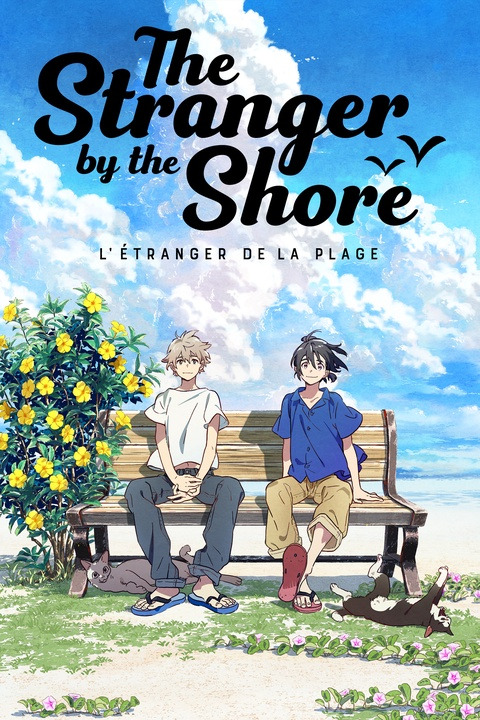
This is a difficult selection because I think it depends on my mood, but for now, I'll go with The Stranger by the Shore (2020). This is a very Japanese take on second-chance romance. I like the way Japan approaches the quiet internalized homophobia that grips us. Some of the same things in Minato's Laundromat can be found here. It's also gorgeous and approaches sex in a frank way that I really loved.
Unit 8: Yaoi

Once again I don't even need to look to know that it's Yuri!!! On Ice (2016). This show is so goddamn gay. I know people feel like it was censored because of the kiss, but these two proposed to each other. It's what sports anime wishes it could be with the open queerness on display from so many characters. It's beautiful and so much fun.
Unit 9: Boys Love

I will not be selecting a favorite BL, but I will say that I really love The Boy Foretold by the Stars (2020) and it's a movie. I loved that we had a femme lead for once and that they explored what faith meant for femmes. It's a film that took the romantic lead's gay awakening very seriously and explored what being together might look like in a sequel called Love Beneath the Stars.
I'm looking forward to you completing the syllabus!
#answered#lgbt film#pariah#the way he looks#the boy foretold by the stars#the wise kids#bent#yuri!!! on ice#the stranger by the shore#big eden#the handmaiden#queer cinema syllabus
81 notes
·
View notes
Note
I am taking a class about queer cinema and pop culture this semester of college and from looking at the syllabus and course material, I am already afraid asexuality and aromanticism will go completely unmentioned, and depending on how focused the material will be on sex, I don't know if I will be able to handle it. Which is sad bc i was really looking forward to taking it 😭The first day we meet is tomorrow so I hope to have this figured out by the end of it but I just wanted to vent about my worries, thank u
Yeah, I feel like this is something that's gotten a bit better in the last ten years, but I think I still see aces and aros overlooked more often than not. And yeah, dealing with sex repulsion can be a real problem.
Good luck, Anon! Hopefully it does go well, because it does sound like a super interesting course.
All the best!
29 notes
·
View notes
Note
Ugh I wish I still had the syllabus but I have purged many of my school documents from my computer. Anal Rope was in fact one of our readings. Some other films we watched included The Living End, Velvet Goldmine, God's Own Country, The Normal Heart, Cruising, Looking For Langston, Swoon, Different From the Others, Weekend, and Una Giornata Particolare (A Special Day) which I was the resident expert on since I had seen it multiple times already in my Italian classes (double major lol). There were definitely some others including one experimental film that had a lot of cars that I can't remember the name of. I also wrote a paper about My Own Private Idaho for our midterm assignment where we chose a film from a list (I do have many of my papers saved) I don't remember most of the readings but for sure we read B. Ruby Rich's article about New Queer Cinema. It was an interesting class despite half of it being online because of the pandemic (this was spring semester 2020)
slay slay slay slay slay I’m just nosy lol and I greatly appreciate the film list 💕💗
#what else is there to do really in The World As It Is Now aside from stream 3 different gay movies in a row…….#anon#answered
21 notes
·
View notes
Text
my year in books
read/goal: 50/50
top 10:
How Much of These Hills is Gold, C. Pam Zhang: In my opinion, a contemporary classic. Weaves Chinese myth with stories of the American Gold Rush. Beautiful prose and valuable takeaways re: family, truth, and gender.
A Little Devil in America: Notes on Black Performance, Hanif Abdurraqib: Essay upon essay of mind-plowing poetics and storytelling. Hanif's version of Baldwin's Devil Finds Work. A wide swath of topics from blackface to spades to magic.
Writers & Lovers, Lily King: Came to me at the exact right (or wrong?) time, just when my father passed away. A keenly-observed novel about grief and persona that is something like if Sweetbitter met Normal People.
How to Write an Autobiographical Novel, Alexander Chee: Inspired me to get over myself and just start writing again. The essay on roses absolutely floored me.
Lose Your Mother: A Journey Along the Atlantic Slave Route, Saidiya Hartman: Hard to stomach, but necessary. Foundational for the way I am thinking about neo-slave narratives and speculative historical fiction.
Seek You: A Journey Through American Loneliness, Kristen Radtke: The minute I read this, I added it to the syllabus for my class on women in isolation. Part graphic novel, part longform essay, part research paper, and wholly extraordinary.
The Sonic Color Line: Race and the Cultural Politics of Listening, Jennifer Lynn Stoever: This one's just for me. The burning core at the center of my reading list and the inspiration and model for my scholarship.
The Street, Ann Petry: Read it because of the book above, but an absolute banger of a book. Devastating ending. Would be extraordinary taught alongside Native Son.
The Fifth Season, N.K. Jemisin: This book has everything. Polyamory. Earth-bending. An alien creature frozen inside a giant piece of rock in the middle of the ocean. Love this woman, love seeing Blackness-as-default in sci-fi novels.
Fun Home, Alison Bechdel: You read it in high school for a good reason. A true exemplar of the genre and a fascinating way to teach non-chronological storytelling.
rest below the cut
Camera Lucida, Roland Barthes
The Invisible Life of Addie LaRue, V.E. Schwab
Brothers & Keepers, John Edgar Wideman
Bunk: The True Story of Hoaxes, Hucksters, Humbug, Plagiarists, Forgeries, and Phonies, Kevin Young
Ninth House, Leigh Bardugo
House of Earth and Blood, Sarah J. Maas
Children of Virtue and Vengeance, Tomi Adeyemi
Emergence of Cinematic Time: Modernity, Contingency, the Archive, Mary Ann Doane
An American Sunrise, Joy Harjo
Nabokov's Favorite Word is Mauve: What the Numbers Reveal About the Classics, Bestsellers, and Our Own Writing, Ben Blatt
Rule of Wolves, Leigh Bardugo
The Lightning Thief, Rick Riordan
Savage Preservation: The Ethnographic Origins of Modern Media Technology, Brian Hochman
The Obelisk Gate, N.K. Jemisin
The Stone Sky, N.K. Jemisin
People We Meet on Vacation, Emily Henry
The Gentleman's Guide to Vice & Virtue, Mackenzi Lee
The Yellow Wallpaper, Charlotte Perkins Gilman
Legendborn, Tracy Deonn
Josh & Hazel's Guide to Not Dating, Christina Lauren
In Cold Blood, Truman Capote
The Race of Sound: Listening, Timbre, and Vocality in African American Music, Nina Sun Eidsheim
One Last Stop, Casey McQuiston
One to Watch, Kate Stayman-London
Time Binds: Queer Temporalities, Queer Histories, Elizabeth Freeman
Gideon the Ninth, Tamsyn Muir
Echo and Narcissus: Women's Voices in Classical Hollywood Cinema, Amy Lawrence
An Extraordinary Union, Alyssa Cole
It Ends With Us, Colleen Hoover
Harrow the Ninth, Tamsyn Muir
Algorithms of Oppression: How Search Engines Reinforce Racism, Safiya Noble
Listening in: Radio and the American Imagination, Susan J. Douglass
How to Fail at Flirting, Denise Williams
The Flat-Share, Beth O'Leary
Radio Voices: American Broadcasting, 1922-1952, Michele Hilmes
Understanding Comics: The Invisible Art, Scott McCloud
The Souls of Black Folk, W.E.B. Du Bois
The Love Hypothesis, Ali Hazelwood
The Road Trip, Beth O'Leary
We Ride Upon Sticks, Quan Barry
#reading list#reading recommendations#of foolish and wise#what i read#2021 books#2021 reads#bookworm#bookish#bookblr#bibliophile#bibliolifestyle
31 notes
·
View notes
Text
The Coolest Movie Theaters Around NYU
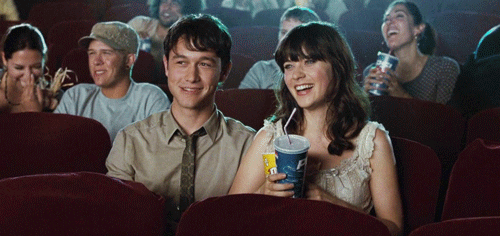
When your school has one of the best film programs in the world, it feels like you have to keep up with all the latest Indie hits and Oscar likelies. Take a study break and get cultured at the most unique movie theaters near NYU!

If you like independent film, then the IFC Center will be your new home. In addition to five theaters that play independent short films alongside cult classics in 35mm, the IFC Center hosts Doc NYC, the largest documentary festival in the US. Keep an eye out for their monthly Queer|Art|Film series that exhibits artwork by and about queer folks, often followed by discussions with the filmmaker. They also host a Studio Ghibli fest in December, so Miyazaki-maniacs get ready!

Maurice Kanbar, the namesake for NYU’s film school, originally opened Quad Cinema in 1972 as the very first multiplex in Manhattan. Recently renovated, the Quad still retains its old-school charm but with a hip, new look. Their four theaters play a range of films, from international classics, cult horror B-movies (in 3D), and a distinct focus on queer filmmakers and subject matters. After the movie, stop by their bar for a draft beer or a glass of wine (if you are over 21, of course).

Only a short walk from NYU Tandon, Alamo Drafthouse is known throughout the country for its dedication to great food, drinks, and distraction-free cinema viewing. Zero cell phone use is allowed in the theater, and they pledge you’ll never have to sit through obnoxious ads before the screening. Their 30-plus beers on draft are all from local breweries, so even though Alamo is a chain, you’re supporting local businesses!

The original Angelika Film Center opened in Soho in 1989, and has since become one of the most successful and recognized arthouse cinemas in the country. Their cozy cafe has an assortment of vegan pastries, sweets, and of course, popcorn and candy, and is open to the public – so if you don’t have time to see a film, you can still come by and take in the movie-loving atmosphere. They host many discussions with filmmakers, so aspiring critics and directors alike should check the schedule to see who’ll be at Angelika next!

Only a block from Third North, the Village East Cinema was originally built in 1925 as a Yiddish Theater. The building has had many uses over the years, being used as a burlesque house in the ‘60s and later hosting off-Broadway future-hits such as Grease and Joseph and the Amazing Technicolor Dreamcoat. Take in the vintage atmosphere of this New York City designated landmark while enjoying Hollywood, foreign, anime, and indie flicks alike, and look out for their many annual film series, like Hitchcocktober, Fearless Femmes in Film, and their own Studio Ghibli Festival.
With so many amazing theaters close by, you can spend that gap between classes watching films and impress your Tisch friends at their next Oscar party. If watching movies at home is more your speed, try one of these movie recommendations from the former Dean of NYU Tisch or make your way through our NYU Film Syllabus. Lights, camera, action! 🎥
11 notes
·
View notes
Text
Challenge Post 1: My Experiences with Horror
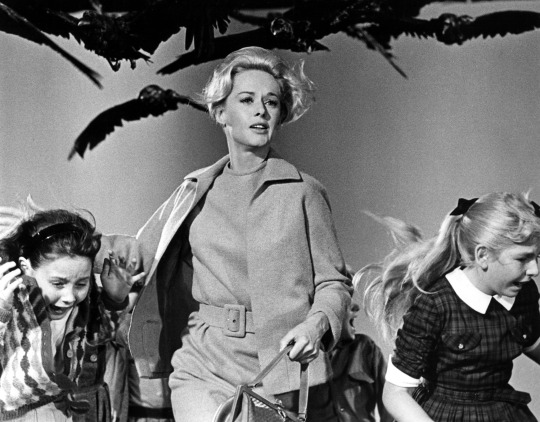
I’ve seen very few horror films in my life—in fact, I hadn’t seen a single film on the syllabus for this class! For the most part, my idea of horror pretty much extends to Buffy the Vampire Slayer and stops there. This isn’t really because of any distaste for horror on my part, though. I mostly just never watched scary movies because my mother doesn’t like to watch them. (I did get her to agree to watch exactly one movie from this class with me, though. I haven’t decided yet whether to have her watch the scariest film or the tamest film.) This class, then, seems like a great primer to the horror genre! Even though I’ve seen so little horror, I’m definitely interested in it, especially in its connection with gender. Last semester, I took an English class called Female Action Hero, which I loved, but I found myself particularly interested in the female villains. I liked seeing what differentiated them from the female heroes, and found it was often some question of monstrosity or deviation. I’m also taking a queer theory literature class this semester, so I’m excited to see how that will intersect with this class! All of this, plus the fact that I’m minoring in film, makes me super excited to be in this course.
One of the first horror films I remember watching was Alfred Hitchcock’s The Birds—a pretty classic first film for my introduction to horror cinema. I was fairly young when I saw it, around eight or nine. I asked my mother about this earlier today, and she told me that she had wanted to show me the film when I would still be scared. She’d shown it to my brother when he was twelve, and he wasn’t scared enough, according to her, so she’d decided to show it to me sooner. Unfortunately for my mother, I don’t remember being too scared. I watched the film with my parents and sister, so maybe there was still too much of a wholesome, family movie night feel associated. My sister and I found the movie more entertaining than frightening, and a few weeks later, we watched it again with one of our friends. All of our reactions were more often laughter than any kind of terror. I don’t know if this was some sort of coping mechanism or deflection, or if we were truly just too young to be scared—which seems possible because when I was just a few years older, I watched the movie Holes and ended up being more scared by that. Either way, I liked that the threat of this film wasn’t something distinctly supernatural and, therefore, dismissible. A flock of birds attacking was unlikely, but still plausible—and that’s what stuck with me.
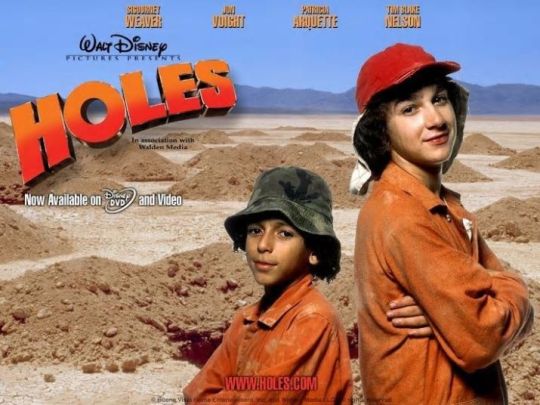
Holes, the true horror film??
2 notes
·
View notes
Text
Arguments over free speech on campus are not left v right
FRESHMEN crowded the lecture hall at 9am for Humanities 110, the first class of their college careers. Elizabeth Drumm, the head of the programme, made some introductory remarks, her voice quavering. As some faculty members moved to take their places at a panel discussion, three demonstrators emerged from the wings of the auditorium. “We’re protesting Hum 110 because it’s Eurocentric,” one began. “I’m sorry, this is a classroom space and this is not appropriate,” Ms Drumm said, immediately cancelling the lecture. Thus began another academic year at Reed College, a liberal arts college in Portland, Oregon.
Last academic year, a dozen or so students continuously occupied the three-day-a-week lecture series by sitting in front of the auditorium with cardboard signs, sometimes taping their mouths in protest at the absence of non-white voices in the syllabus. One even took to lecturing the freshman class on the podium from an alternate curriculum before the start of each session. But this year, the college’s president sent out an e-mail outlining the school’s dissent policy 16 minutes before the lecture began, warning that the administration would act against potential violations. Reed College students were ranked as the most liberal and the second most studious in Princeton Review’s survey of its top 382 liberal arts colleges. That compound of leftist politics and serious scholarship proved unstable last year as activists managed to cow the college’s administration, students and faculty alike.
The protesters argue that the Humanities programme is racist because it ignores many of the world’s great civilisations and because its authors are overwhelmingly male and white. They point out that black students represent less than 3% of the school’s 1,400 students and argue that the administration has not done enough to support them. A good portion of the student body appear to support their goals and tactics.
Assistant professor Lucia Martinez Valdivia, who describes herself as mixed-race and queer, asked protesters not to demonstrate during her lecture on Sappho last November. Ms Valdivia said she suffered from post-traumatic stress disorder and doubted her ability to deliver the lecture in the face of their opposition. At first, demonstrators announced they would change tactics and sit quietly in the audience, wearing black. After her speech, a number of them berated her, bringing her to tears.
Demonstrators said Ms Valdivia was guilty of a variety of offences: she was a “race traitor” who upheld white supremacist principles by failing to oppose the Humanities syllabus. She was “anti-black” because she appropriated black slang by wearing a T-shirt that said, “Poetry is Lit”. She was an “ableist” because she believes trigger warnings sometimes diminish sexual trauma. She was also called a “gaslighter” for making disadvantaged students doubt their own feelings of oppression. “I am intimidated by these students,” she later wrote in a blog post. “I am scared to teach courses on race, gender or sexuality or even texts that bring these issues up in any way…I’m at a loss as to how to begin to address it, especially since many of these students don’t believe in historicity or objective facts (they denounce the latter as being a tool of the white cisheteropatriarchy).”
A few weeks later, the college invited Kimberly Peirce, the gender-fluid director of “Boys Don’t Cry”, which was widely praised as the first sympathetic portrayal of trans people in cinema. Protesters ripped down posters promoting the event and put up their own posters that said: “Fuck this cis white bitch” (“cis” being shorthand for cisgendered, or people who identify with their birth sex) and “Fuck your transphobia.” When Ms Peirce tried to speak, they shouted her down because they felt she had profited from violence against trans people and because she had cast Hillary Swank, a non-trans actor, as the lead. The dean of faculty, Nigel Nicholson, later wrote that students came to the session “asking questions designed to indict the speaker…It felt like a courtroom, not a college.”
Earlier in the year, demonstrators presented the administration with a sensible demand, to make more effort to attract and retain black students, and a lot of eccentric ones, including a beefed-up role for students in judging grievances against faculty, and collegewide racial sensitivity training. They also demanded a paid annual staff holiday honouring the day of their initial demonstration.
Thermidorian reaction
Many students have said privately that the campus has become a place where they are afraid to express dissenting opinions. Students who disagree with the protesters’ views, on social media, have been denounced as racists by activist leaders. A newly accepted international student was mocked when she asked her future classmates if there were any libertarian groups on campus. White students have complained that they have been told by other students that they are unjustified in speaking about race and identity in class. When one student voiced a dissenting opinion on social media, his classmate threatened to get him fired from his job at the college bookstore. “It’s an environment with limited representation of opinion, and it can be hostile to students who hold other views,” says Yuta Kato, a sophomore.
Yet at Reed College this term there are also signs of a counter-revolution. A professor of Muslim studies refused to lecture in front of protesters and taught his class of 150 students outside, under a tree. Some freshmen have shouted down protesters. One (black) student told them: “This is a classroom. This is not the place. Right now we are trying to learn. We are freshmen students.” The rest of his speech was drowned out by applause.
This article appeared in the United States section of the print edition under the headline "Blue on blue"
http://ift.tt/2gOwjUG
1 note
·
View note
Text
fuck the syllabus for my queer cinema class is so good im gonna peeee im excited that’s gonna be such a relief for me honestly
1 note
·
View note
Link
Introduction
From the pioneers of film to post-digital trailblazers, the aim of this challenge is to take you on an adventure through the history of film.
This challenge will take place across the 52 weeks of 2018. Each week will address a new topic that will provide signposts through your journey. The goal is to watch at least one film each week that will expand your experience of film.
The syllabus can be found below. Each weeks topic will be accompanied by a link to a list of suggested films but feel free to choose any film that you feel meets that week's subject.See the List notes for weekly dates and tags.
I have included the topics from last year's syllabus for revision purposes. Feel free to mix and match this years and last years topics. Or do both!
Rules
1. Each week you must watch the film that you have selected for that week's topic;
2. After having watched each film you must write and post a review of at least five sentences;
3. Ensure that you tag each film with the challenge tag FSDO2018. Also make sure you tag it with the weekly tag, for example, FSDO2018Week1. This will enable other students to find your reviews;
4. Read other student's reviews and share comments with one another.
Please Note
- All of these rules are voluntary;
- If you are unable to watch the listed movie in any given week you can skip it or watch it later;
- Feel free to make up your own topics for any given week if you dont like the existing topic or if you are unable to gain access to a movie that fits it;
- Feel free to change any movie on your list at any time. The availability of a film often makes this necessary;
- If you don't like writing reviews you don't have to. Maybe comment on other people's reviews so you can still be a part of the dialogue (although you don't have to do that either).
- Ultimately, the only rule is to have fun!
- I struggled to include everyone's suggestions for new topics. I wanted to add many more but alas it was not to be so. Look out for them in 2019.
The Weekly Topics
Week 1 - (2018) - Actors - Lillian Gish - Filmography or Mary Pickford - Filmography
Week 1 - Revision (2017) - Auteurs - Pioneers of Film - Lumiere Brothers (Filmography), George Melies (Filmography) or Alice Guy-Blache (Filmography)
Week 2 - (2018) - Genre - The Early Epic (1915 - 1935) - Examples
Week 2 - Revision (2017) - Genre - Comedy - Examples
Week 3 - (2018) - Movement - Scandinavian Silent Cinema in the 1920s - Examples
Week 3 - Revision (2017) - Movement - German Expressionism (1920-1927) - Examples
Week 4 - (2018) - Studio - MGM Studios in the 1930s - Examples
Week 4 - Revision (2017) - Genre - Action - Swashbuckler - Examples
Week 5 - (2018) - Movement - French Surrealism (1924-1941) - Examples
Week 5 - Revision (2017) - Movement - Russian Montage (1923-1934) - Examples
Week 6 - (2018) - Genre - Musicals - The Depression Era (1933-1939) - Examples
Week 6 - Revision (2017) - Genre - Romance - Screw Ball Comedy - Examples
Week 7 - (2018) - Movement - Golden Age of Yiddish Cinema (1936-1940) - Examples
Week 7 - Revision (2017) - Movement - French Poetic Realism (1930-1945) - Examples
Week 8 - (2018) - Actors - Nargis - Filmography or Shirley [Yoshiko] Yamaguchi - Filmography
Week 8 - Revision (2017) - Genre - Crime - Pre-Code Gangster Movie - Examples
Week 9 - (2018) - Auteurs - Oscar Micheaux - Filmography
Week 9 - Revision (2017) - Auteurs - Alfred Hitchcock - Filmography
Week 10 - (2018) - Movement - Avant Garde - The Second Wave - Examples
Week 10 - Revision (2017) - Movement - Italian Neo-Realism (1943-1954) - Examples
Week 11 - (2018) - Cinematographer - Jack Cardiff - Filmography
Week 11 - Revision (2017) - Genre - Crime - Film Noir - Examples
Week 12 - (2018) - Auteurs - Kenji Mizoguchi - Filmography
Week 12 - Revision (2017) - Auteurs - Orson Welles - Filmography
Week 13 - (2018) - Movement - Early Indian Parallel Cinema & The Indian New Wave (1946-1976) - Examples
Week 13 - Revision (2017) - Movement - French New Wave (1959-1970) - Examples
Week 14 - (2018) - Studio - The Golden Age of Disney (1940-1960) - Examples
Week 14 - Revision (2017) - Genre - Sci-Fi - 1950s Cold War Film - Examples
Week 15 - (2018) - Costume Designer - Edith Head - Filmography
Week 15 - Revision (2017) - Auteurs - John Ford - Filmography
Week 16 - (2018) - Movement - The Egyptian Golden Age (1940-1969) - Examples
Week 16 - Revision (2017) - Movement - Kitchen Sink British Realism (1959-1969) - Examples
Week 17 - (2018) - Visual Effects - Ray Harryhausen - Examples
Week 17 - Revision (2017) - Genre - Historical - Swords and Sandals - Examples
Week 18 - (2018) - Auteurs - Robert Bresson - Filmography
Week 18 - Revision (2017) - Auteurs - Michelangelo Antonioni - Filmography
Week 19 - (2018) - Movement - Yugoslav Black Cinema (1963-1972) - Examples
Week 19 - Revision (2017) - Movement - Cinema Novo (1960-1972) - Examples
Week 20 - (2018) - Genre - Science Fiction New Wave (1960-1980) - Examples
Week 20 - Revision (2017) - Genre - Western - Spaghetti Westerns - Examples
Week 21 - (2018) - Auteurs - Lino Brocka Filmography
Week 21 - Revision (2017) - Auteurs - Ingmar Bergman - Filmography
Week 22 - (2018) - Movement - Polish Film School (1955-1963) - Examples
Week 22 - Revision (2017) - Movement - Czech New Wave (1962-1972) - Examples
Week 23 - (2018) - Auteurs - Ousmane Sembene - Filmography
Week 23 - Revision (2017) - Auteurs - Douglas Sirk - Filmography
Week 24 - (2018) - Genre - Italian Eurocrime/Poliziotteschi - Examples
Week 24 - Revision (2017) - Movement - New German Cinema (1962-1982) - Examples
Week 25 - (2018) - Auteur - Raul Ruiz - Filmography
Week 25 - Revision (2017) - Auteurs - Stanley Kubrick - Filmography
Week 26 - (2018) - Movement - Feminist Film Movement (1970s) - Examples
Week 26 - Revision (2017) - Movement - New Hollywood (1968-1980) - Examples
Week 27 - (2018) - Writer - Paul Schrader - Filmography
Week 27 - Revision (2017) - Auteurs - Robert Altman - Filmography
Week 28 (2018) - Actor - David Gulpilil - Examples
Week 28 - Revision (2017) - Movement - Australian New Wave & Ozploitation (1971-1989) - Examples
Week 29 - (2018) - Genre - Documentary - Direct Cinema - Examples
Week 29 - Revision (2017) - Genre - Documentary - Cinema Verite - Examples
Week 30 - (2018) - Writer - Marguerite Duras - Filmography
Week 30 - Revision (2017) - Auteurs - Woody Allen - Filmography
Week 31 - (2018) - Cinematrographer - Sven Nykvist - Filmography
Week 31 - Revision (2017) - Movement - Japanese New Wave (1955-1975) - Examples
Week 32 (2018) - Movement - L.A. Rebellion - Examples
Week 32 - Revision (2017) - Genre - Action - Blaxploitation - Examples
Week 33 - (2018) - Movement - Post-Colonial African Cinema- Filmography
Week 33 - Revision (2017) - Auteurs - Federico Fellini - Filmography
Week 34 (2018) - Composer - Ennio Morricone - Examples
Week 34 - Revision (2017) - Movement - No Wave (1976-1985) - Examples
Week 35 - (2018) - Genre - Japanese Pinku - Examples
Week 35 - Revision (2017) - Genre - Erotic - 70s Arthouse - Examples
Week 36 (2018) - Auteurs - Agnes Varda - Filmography
Week 36 - Revision (2017) - Auteurs - Andrei Tarkovsky - Filmography
Week 37 - (2018) - Movement - Holocaust Films - Examples
Week 37 - Revision (2017) - Movement - Hong Kong New Wave (1979-1989) - Examples
Week 38 - (2018) - Genre - Chop Socky - Hong Kong Martial Arts - Examples
Week 38 - Revision (2017) - Genre - Western - Post-50s Revisionist Western - Examples
Week 39 - (2018) - Auteurs - Jan Svankmajer - Filmography
Week 39 - Revision (2017) - Auteurs - Luis Bunuel - Filmography
Week 40 - (2018) - Editor - Dede Allen - Examples
Week 40 - Revision (2017) - Movement - Cinema Du Look (1980-1991) - Examples
Week 41 - (2018) - Genre - 80s Teen Movies - Examples
Week 41 - Revision (2017) - Genre - War - Vietnam - Examples
Week 42 - (2018) - Auteurs - Spike Lee - Filmography
Week 42 - Revision (2017) - Auteurs - Akira Kurosawa - Filmography
Week 43 (2018) - Movement - New Queer Cinema (1990s - Current) - Examples
Week 43 - Revision (2017) - Movement - Iranian New Wave (1987-2005) - Examples
Week 44 - (2018) - Auteurs - Peter Greenaway - Filmography
Week 44 - Revision (2017) - Auteurs - David Lynch - Filmography
Week 45 - (2018) - Movement - Nollywood - Examples
Week 45 - Revision (2017) - Movement - Tawain New Wave (1990-2010) - Examples
Week 46 - (2018) - Studio - Pixar Animation Studios - Examples
Week 46 - Revision (2017) - Genre - Japanese Anime - Examples
Week 47 - (2018) - Movement - Romanian New Wave (2004-Current) - Examples
Week 47 - Revision (2017) - Movement - Nuevo Cine Mexicano (1992-Current) - Examples
Week 48 - (2018) - Genre - Cyberpunk & Tech Noir - Examples
Week 48 - Revision (2017) - Genre - 90s Rom-Coms - Examples
Week 49 - (2018) - Auteurs - Christian Petzold - Filmography
Week 49 - Revision (2017) - Auteurs - Coen Brothers - Ethan's Filmography & Joel's Filmography
Week 50 - (2018) - Movement - Mumblecore - Examples
Week 50 - Revision (2017) - Movement - Dogme 95 (1995-2005) - Examples
Week 51 - (2018) - Movement - Greek Weird Wave - Examples
Week 51 - Revision (2017) - Genre - Post-Modern - Black Comedy - Examples
Week 52 - (2018) - Auteurs - Guy Maddin - Filmography
Week 52 - Revision (2017) - Auteurs - Michael Haneke - Filmography
Broken Blossoms
Week 1 - (2018) - Actors - Lillian Gish
Intolerance: Love's Struggle Throughout the Ages
Week 2 - (2018) - Genre - The Early Epic (1915 - 1935)
The Passion of Joan of Arc
Week 3 - (2018) - Movement - Scandinavian Silent Cinema in the 1920s
The Thin Man
Week 4 - (2018) - Studio - MGM Studios in the 1930s
L'Âge d'Or
Week 5 - (2018) - Movement - French Surrealism (1924-1941)
Footlight Parade
Week 6 - (2018) - Genre - Musicals - The Depression Era (1933-1939)
Tevye
Week 7 - (2018) - Movement - Golden Age of Yiddish Cinema (1936-1940)
The Musketeers of Pig Alley
Week 8 - Revision (2017) - Genre - Crime - Pre-Code Gangster Movie
Body and Soul
Week 9 - (2018) - Auteurs - Oscar Micheaux
Shadows
Week 10 - (2018) - Movement - Avant Garde - The Second Wave
...plus 42 more. View the full list on Letterboxd.
Logged on Letterboxd
0 notes
Text
Queer as a Category
The Moving Image Resource Centre is a media library maintained by the Faculty of Fine Arts at Concordia University. MIRC supports students and faculty through allowing access to over 39,000 films for the purpose of archivization and research. Films are searchable by title, director, year, format, language, run times, distributors, “synopsis contains” and “subject contains”. I looked through MIRC’s catalogue looking for queer categorization.
The “subject contain” option is a drop down menu of pre-articulated categories. There is no queer category in this field. There is a “Gay and Lesbian Studies” category, which matches 135 titles. The “synopsis contains” query is an open text field. Upon searching this option for “QUEER”, only 7 titles are found. However, this is perhaps to be expected, as films are not expected to express “queer” typology specifically within their synopsis write up. All of the films listed in FMST 392, except for one title, are available at MIRC. Of the 13 films listed in the FMST 392 syllabus, only two are searchable under “Gay & Lesbian Studies”, and none in “queer”.
“Queer” in categorization may touch upon characters, authorship, film festivals, or to a queering of cinema itself. When speaking of “queering cinema”, it may suggest a transgressive artistic element. For example, the Queer Palm award at Cannes does not implicitly state the importance of sexual identity in a film for its inclusion in the award. Cannes insists upon film as an artistic form, and also utilizes “queer” as a term non-traditionally pointing towards innovations of artistic quality.
Antoine Damien’s Queer Cannes discusses the strengths of “queer” categorization within film festivals, by broadening audiences based on representation via “film” and “queer”, separately and simultaneously. The article addresses queer awards at film festivals, yet aspect of naming and categorization can be applied to media archives. The utilization of a search function can include “queer” without erasing other categorizing signifiers.
I find it intriguing that a media archive, such as MIRC, within a contemporary liberal institution lacks LGBTQ representation. I emailed the head of the MIRC, Oksana Dykyj, asking about the scarce search options for “queer” film, and limited “Gay & Lesbian Studies”. The response came with links to articles on queer archives, as well as this statement:
“I appreciate your bringing this issue to our attention. We have other subject terms which also need revising and we will try to get funding for getting this endeavour off the ground in the new budget year.”
MIRC’s catalogue does hold places for queer bodies, yet does not use the language of queer naming. However helpful it is that the media exists, this could be hindering viewership to queer films by the lack of categorization within the academic context.
Sasha Pozzolo
References:
Damiens, Antoine. “Queer Cannes: On the Development of LGBTQ Awards at AList
Festivals: A Festival Report”. Synoptique: An Online Journal of Film and
Moving Image Studies 3, no. 2, (Winter 2015): 93-100.
"Moving Image Resource Centre." Moving Image Resource Centre. N.p., n.d. Web. 16 Mar. 2017.
0 notes
Text
Bengiyo's Queer Cinema Syllabus
Hello! After a holiday hiatus, I am returning to @bengiyo's queer cinema syllabus. We will be ringing in the new year with Unit 4: Heartbreak Alley, the totally light-hearted, definitely not agonizing section of the syllabus where I get to watch countless acts of violence be committed against queer people. That fuck I have Lesbians waiting for me at the end of this unit. The films in Unit 4 are: Bent (1997), Strange Fruit (2004) [cannot for the life of me find this film], Boys Don’t Cry (1999), Brokeback Mountain (2005), Parting Glances (1986), Philadelphia (1993), The Living End (1992), Holding the Man (2015), Jeffery (1995), and Boys on the SIde (1995)
Today I will be writing about
Brokeback Mountain (2005) dir. Ang Lee
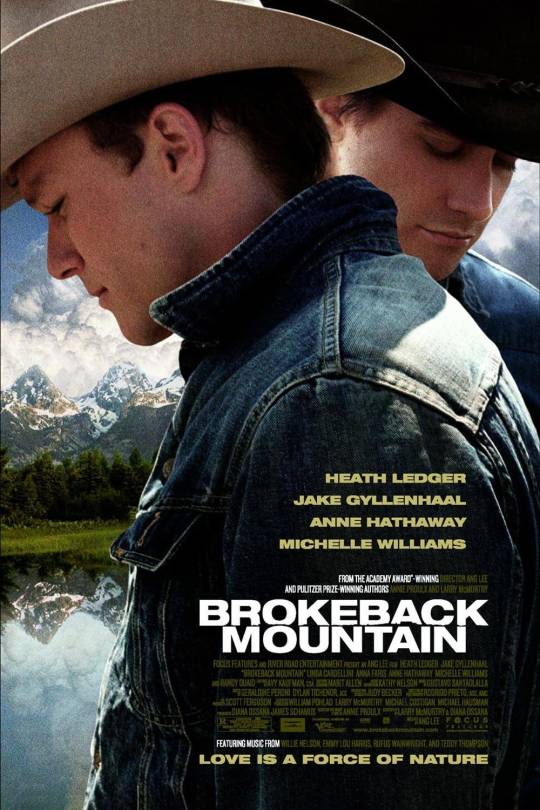
[Run Time: 2h 14 min, Lang: English]
Summary: “Ennis and Jack are two shepherds who develop a sexual and emotional relationship. Their relationship becomes complicated when both of them get married to their respective girlfriends.” -imdb
Cast:
* Jake Gyllenhaal as Jack Twist
*Heath Ledger as Ennis del Mar (Rest in Peace)
__
Okay, so unsurprisingly Brokeback Mountain is one of seven of the movies on this syllabus that I had seen before I embarked on this project. I watched it for the first time in 2021 and walked away from it with two images in my head: Jack and Ennis’ reunion kiss and Jack getting his face bashed in with a tire iron. This film is in Heartbreak Alley for a reason and that’s because it is fundamentally depressing as fuck. Jack and Ennis are stuck in unhappy marriages, lonely all their lives, struggling to carve desire out of a life that does not let them have it. Ennis ends up alone, and Jack ends up dead and these things are important. Ennis slipped out of his role as attentive father and doting husband the second Jack walked back in to his life, Jack kept breaking his own heart by daring to dream of the life that he wanted.
A life he was denied.
I want to mention these tragedies up front because I want primarily to talk about something else in this film. But i do not want to just push past the violence here. This is probably something other people have heard, it was definitely something I was told by the person who recommended this film to me the first time. But the way Jack dies, the way Earl dies, these are both similar to the way that Matthew Shepard died. Matthew Shepard was kidnapped, pistol whipped, tortured, and tied to a fence in Wyoming for being gay and was so brutally beaten his entire face was covered in blood. Jack was beaten to death with a tire iron on the side of the road, Earl was brutally tortured and left in a ditch. These men are not just killed, but brutally, violently, torturously murdered for being queer.
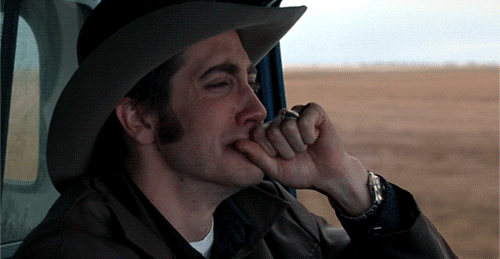
That said, this movie felt so different to me the second time I watched it and I am so amazed to see how much I truly missed my first time around. I was younger, freshly queer, and did not have anywhere close to the extensive queer media viewing history I do now. It is wild to me to see how I have grown in my engagement with media after spending a year writing about body language. Because this film is so fucking brilliant, like legitimately intelligently crafted in it’s displays of gay politics. Maybe this is stuff that I picked up on subconsciously the first time through because I never found the movie boring despite it being rather slow. But this time? My brain was buzzing at how expertly crafted the dialogue and body language was around trying to be safe while being queer.
I am thinking of the way that Jack sizes Ennis up at the beginning, Jack’s posture as he leans against his truck the first time they meet. I’m thinking about the line “Mr. Augirre’s got no right making us do something against the rules” when you consider that queerness is very much against the rules at that time and in that place. The way Ennis refuses to let Jack be gentle with him at first, tending his own wounds, staying distant and quiet, until he doesn’t.
Maybe it’s just because of how much I’ve watched The Sign drift further away from the hyper-masculinity aspect of their story, but I could not stop thinking about the delicate dance that is required to navigate the growing feelings and sexual relationship between these two extremely masculine men. I started looking and I think there are about three times in the entire movie where Jack and Ennis are soft with each other. The first is on Brokeback the second time they have sex, and Ennis is struggling and just rests his head on Jack’s chest before going in for a kiss. The second is when they are cuddling in bed at the motel after their first reunion. The third is the scene after Ennis tells Jack he won’t be able to see him again until November. That’s it. Otherwise they aren’t touching, or when they are touching they are rough, rough housing, rough kissing, rough fucking it doesn’t matter.

Ennis says he isn’t queer and Jack says he’s not either, but they fuck and then they are drawn to one another for the rest of their lives, because there is no one who could get it like they do. Ennis isn’t lying when he tells Jack that is the most he’s spoken in a year. Ennis is a lonely man. Ennis is a rural, hyper-masculine rancher he does not have emotions, not anymore, if he ever did. Whatever conscious or subconscious queerness he had undoubtedly shriveled and died the day he was shown Earl’s body. And that, I think, is part of why Ennis is just constantly drawn to Jack, why his face lights up when he sees Jack, why he throws such caution to the wind upon their first reunion.
Ennis does not need words for Jack to understand him. Jack is also a rural, hyper-masculine rancher. He gets it in a way that Alma never will. The violence they bestow upon each other, Jack understands why Ennis would lash out. The need to escape in to the mountains, Hack understands why Ennis needs it. It’s just so smartly written. Ennis so unmoored from his own feelings that his body physically rejects them when he and Jack separate for the first time. The way he has to suck it in, suck it up, pretend like he’s unfazed, unaffected, until the minute he has a chance to be out of eyesight, and then he just collapses retching, sobbing, punching walls.

And then he’s able to separate himself from his emotions once more, he marries Alma, he stays lonely, he does his duties, until Jack comes calling. I think I remember a story about how the first kiss that Heath and Jake have when Ennis and Jack are reunited, their faces slammed together so hard one of them almost broke a nose. And that is how 90% of Ennis and Jack’s relationship is. Those emotions come back and then Jack is leaving again, and Ennis just starts to crumble.
I could not stop thinking about the dialogue in this film Mr. Aguirre’s carefully chosen words when he is telling Jack exactly why he isn’t hiring him for another season, the way Jack tries to suss out if the man sitting next to him at the bar after the rodeo is queer and down to fuck, how that man picks up on it, rejects him, and how quickly Jack gets the fuck out of the bar afterwards. The inherent understanding of what being invited to the cabin means in that conversation with David Harbor’s character. GOD, it’s just so well done.
Favorite Moment
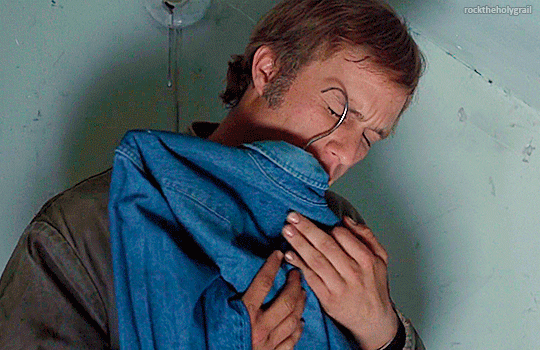
To continue on the subject of incredible code work in this movie, my favorite scene is when Ennis goes to visit Jack’s parents to try to get Jack’s ashes so he can spread them on Brokeback Mountain. How without ever saying anything directly, Jack’s parents are able to convey that they know the reason Jack died, what Jack and Ennis were to each other, and that they accept Jack and accept Ennis was just beautiful. The way she lets Ennis go up to Jack’s room, Ennis finding the shirts, stained with blood because that’s what it is to be queer, Jack’s mother letting Ennis take those with him, Jack’s father saying: “We’ve got a family plot. He’s going in it.” as Ennis is about to walk out the door, Jack’s mother saying: “You come back and see us again” and not have either of those things feel like a threat or a trap? It was incredible.
Favorite Quote
Hmm, I know we have the two famous quotes, but it’s hard to pick a favorite line because there is so little dialogue in this film considering it is over two hours long. I think I am going to go with the last line of the movie:
“Jack, I swear”
Cause it made me cry. Alma Junior pays a visit to her father to let him know she’s getting married, and she drives away forgetting her coat, and Ennis opens his closet (intense staring at the visual commentary) and he buttons the top button of Jack’s shirt, and he swears to Jack and to me that feels like a wedding vow.
Score
10/10 This film is gorgeous, just utterly beautiful all around. The cinematography, the script, the commitment and the care the actors give to these characters, to the subject. I am so glad this was on the syllabus so I had this opportunity to revisit this film. I got a whole lot more out of it as a result.
#bengiyo queer cinema syllabus#queer cinema syllabus#queer cinema#unit 4: heartbreak alley#brokeback mountain
74 notes
·
View notes
Note
Hello hello ~~
Through wen-kexing-apologist's recent post about The Birdcage (which seems to come from your syllabus for baby gays) I got to the original series of reblogs which resulted in said syllabus. I read most of it (not everything because Real Life has my time hostage), and as someone who has seen her fare share of queer media I have now a pretty long to watch list.
As you wrote about how you enjoyed the romance of queer media I have a question.
Recently I have come across a Netflix movie trailer called Love at First Sight. With such a basic trope as a name I checked it out hoping the title to be misleading and to see something surprising in the plot. The disappointment I felt when by the end of it I realized it was exactly what the title sold: the most basic boy meets girl and they have to look for each other throughout the whole movie.
One of the things I really appeciate about queer media (and mainly BL probably) is the possibility to explore different kinds of romances and emotions. Both positive and negative. From Not Me to Heartsopper to Double Mints. I feel that being "out of the norm" they explore such emotions and situations in a more interesting and relatable way (and add to that that I, as a woman, cannot stand women characters making a 360º personality change once they fall in love)
So here's my question: what unusal or out of the ordinary romances would you like to see more of in BLs/queer shows/etc?
I personally would like romances with disabled characters to be more explored (I'm really looking forward to Last Twilight) or polyamory. Also more GL.
I admit this might be a very biased ask, it comes 100% from my subjective view, and I have yet to watch most of the movies in your syllabus for Baby Gays.
Anyway, I hope you have a great day and that this long ask won't bother you ❤
Well look at this ask! Let me get into this!
The Syllabus is on a Google Doc
First, I sincerely appreciate you watching me and @shortpplfedup go back and forth about stuff. For yours and others' convenience, I did put the Queer Cinema Syllabus in a Google Doc for @wen-kexing-apologist
Some Recommendations
If you're looking for a film with a disabled protagonist and also a bit about women, I would recommend checking out Margarita With a Straw (2014), Sleep With Me (2022) (I watched on Gaga), or if you're willing to tolerate hets Isa Pa With Feelings (2019) (currently on Netflix) or Silent (2022) (Viki)
If you're interested in more polyamory, I genuinely think that Quaranthings Season 2 (2021) does some really fascinating stuff worth checking out. We had complicated feelings about Me, My Husband, and My Husband's Boyfriend (2023), but I liked it.
What do I want though?
I think this is a harder question for me to answer than I was expecting. I see myself as a guest when I'm watching a lot of content from Southeast Asia. I will voice my opinion on what I like and don't like, what I'm taking from these shows, and how they're affecting me. However, I don't really consider myself the target audience. I watch the shows as legally as possible and help generate engagement, but the "interfans" they care about are the English-speaking Asians in their region, not really me I feel like.
So when I think about what I want, I don't feel a yearning for any of the BL-producing Asian countries' film industries to make it for me.
I want to see the shit I like in the West get made. I want to see Black queer people presented complexly (Here is my regular plug for For The Boys). I'm a fat black gay nerd. The last time I saw a fat black gay nerd that I liked in an American production was Fire Island (2022).
I'm a 33-year Star Trek fan who still thinks we need more GAYS IN SPACE. I'd like to see more productions like Sort Of (2021- ) where complex queer friend and social groups navigate just existing in the world and finding love and meaning. I'd like to see less of reboots of classic shows like Queer as Folk be about a horrifying mass death event in the city I live in and the spaces I frequent (I refuse to link to it).
I want to see TJ Klune's, Ginn Hale's, or Lynn Flewelling's works adapted to series. I would like to see more wide release queer shit in the West not be overwhelmingly about fit, attractive, young white guys.
I want distribution for queer stories to not always have to go through four years of distribution hell because of the film festival circuit.
I want the West to try to make BL! I don't care if it feels cheap on the front end. I just wish more of us would be willing to throw support behind web shows. We did it for Awkward Black Girl! We can do it again!
This is turning into rambling, so I'll say that I don't necessarily have strong feelings about what I absolutely need to see. I like connecting with the specific humanity of stories, especially if they're about queer people. I didn't know I needed Moonlight (2016) until I saw it. I didn't know I needed Make the Yuletide Gay (2009) or Black Sails (2014-2017) until I watched them.
I just want more people with ideas to get a chance to turn them into something cool for us.
What about the rest of you? Please tag me if you have things you're hoping for.
39 notes
·
View notes
Text
Bengiyo Queer Cinema Syllabus
Not to sound repetitive but, I had a busy couple weeks, but finally had a second to return to @bengiyo’s queer cinema syllabus. I am currently working my way through Unit 4: Heartbreak Alley, the totally light-hearted, definitely not agonizing section of the syllabus where I get to watch countless acts of violence be committed against queer people. Thank fuck I have Lesbians waiting for me at the end of this unit. The films in Unit 4 are: Bent (1997), Strange Fruit (2004), Boys Don’t Cry (1999), Brokeback Mountain (2005), Parting Glances (1986), Philadelphia (1993), The Living End (1992), Holding the Man (2015), Jeffery (1995), and Boys on the Side (1995).
Today I will be talking about
Parting Glances (1986) dir. Bill Sherwood

[Run Time: 1:30, Available: tubi and fubo, Language: English]
Summary: As Michael and Robert, a gay couple in New York, prepare for Robert's departure for a two-year work assignment in Africa, Michael must face Robert's true motives for leaving while dealing with their circle of eccentric friends, including Nick, who is living with AIDS.
Cast:
John Bolger as Robert
Richard Ganoung as Michael
Steve Buscemi as Nick
__
Well, I have to say this was very much not what I was expecting for the first AIDS related movie of the syllabus. After some pretty hefty violent deaths of queer characters in the first half of Unit 4, I was very much anticipating the heart wrenching tragedies to continue immediately once I hit the AIDS epidemic portion. But Parting Glances very much subverted my expectations of what I was walking in to, because honestly…so much of it was lovely.
It’s not that tragedy is not a part of this movie, it is, it’s just hidden under the layer of friendship, community, and love that feels like the core theme of the film. I am thinking about the party at Joan’s and how much happiness and celebration was happening there, with community abound, and yet how Michael kept telling people they should call Nick because he would appreciate it, showing just how much Nick has lost of his own community since his HIV/AIDS diagnosis.

I really loved how real these relationships to one another felt, the way that Michael and Robert were playful with each other, the way that Nick sat on Michael’s lap so casually for a few minutes when Michael cooked him dinner, I loved the conversation Robert had with his ex-girlfriend, the young and hopeful queer boy who wished to live forever. I just loved watching the queer community be a queer community.
Even in the moments that get a little dour, where Michael gets especially weepy with Nick, those scenes did not make me sad, did not destroy me the way other films in this syllabus have, because that is just grief. Grief is a mighty and terrible thing, but I find beauty in it as well. I find beauty and loveliness in the fact that those tears came from Michael finally admitting to Nick that he loved him, that Nick got to hear himself that he was loved, especially when so many people seemed to have fallen away from him after his diagnosis. I find comfort in the conversations about death that Michael and Joan have together, because those are conversations I’ve had, they feel familiar, they feel like a natural part of life, perhaps they should not have to feel those points so soon, but Nick himself is right, living forever is the only thing none of us can do.

I really loved that we saw Nick when he was at a stage in his illness where he was simply being careful, but was still full of life, energetic, that he was able to be a support system for Michael and was not only being tended to. We know what is coming, but we are not made to see it. I was really in to what the film did with it’s use of ominous backing track, that Nick could hear it, that it felt like the progression of his illness, that it felt like a sense of impending doom, a cloud that hangs over Nick.
Throughout a lot of this film I found myself thinking about The Inheritance Part One & Part Two, a play written in 2016 based off of the book Howard’s End by EM Forster. I saw this play a few years back and was lulled in to a false sense of security that this would not be a play about AIDS because it was set in the relatively modern day with a focus on younger queer characters, but ohhhhhhh how wrong I was. Towards the end of the first part, we hear a story from a character named Walter, an older gay man that lived in the same building as the main characters, and he recounts the story of his life, how his husband, Henry, built a farm outside of New York city for the two of them to live in…right around the time that AIDS started decimating the area. How that distance still was not good enough for Henry so he would leave on business trips, because his fear of catching AIDS was so strong.
Walter tells the story of when he went back in to the city for the first time, and ran in to a friend he used to know, who had acquired AIDS and was on the brink of death. He talks about how when Henry was away, he brought that kid to the farm Henry had built to hide from AIDS, and Walter cared for that boy until he died. Walter talks about doing that again and again and again and again, dozens of times, he would go in to the city, bring a friend back home, and care for them until they passed.
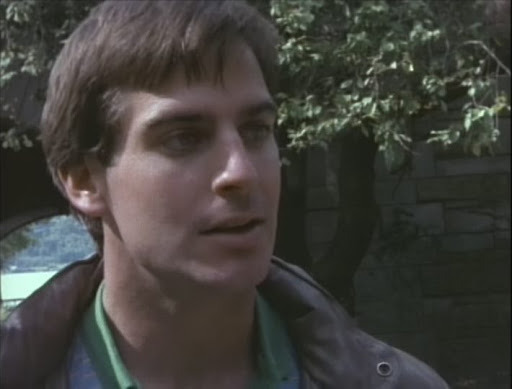
^[sidebar: I very much do not like Robert]
Part of the play ends with Walter being asked what it was like at that time, Walter asks the main characters to name someone they know, they give a name, he says “they’re dead. Give me another name, he’s dead”. For what felt like minutes, name after name after name is called and name after name after name is dead. When I saw that scene I broke down in the theater, I cried for the entirety of the walk back to the train station, I was brought to the brink of tears at the thought of that scene for a month after I saw the show.
I mention this because it was all that I could think about while watching Robert and Michael interact with one another, while seeing this plot unfold. Robert fleeing New York while Michael stayed to care for his dying friend. Knowing that Walter and Henry stayed together after all was said and done, after Henry had stopped running from reality, and the death rates had slowed; then seeing Robert decide not to go to Africa, and how Michael did not show any signs of planning to break up with Robert knowing, despite knowing how Robert felt too settled, how Robert had chosen to go, despite knowing that Robert was running from loss, and running from being a support for Michael when the love of his life finally dies.
So despite the fact that Parting Glances didn’t evoke the same feelings, though I felt like overall it was a relatively upbeat, uptempo, gentle film, the current underneath it all, the dying underneath it all, the tragedy is right there but it is just out of reach.
Favorite Scene
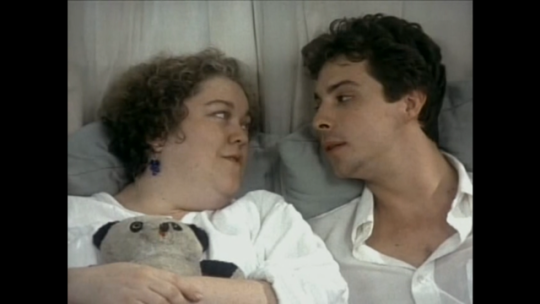
I think my favorite scene is when Joan and Michael are laying in bed together, holding stuffed animals at Robert’s going away party while they just casually talk about death and dying. It just felt very much like a conversation I have had with my best friend on multiple occasions, especially lately because we've had a number of deaths happen in our lives recently. And yes, my friend and I both match the type of conversation part this scene, and also the beating each other up with stuffed animals part of this scene.
Obviously we do not spend enough time with the other characters at the party to know exactly what is going on in their lives, and there is not doubt many if not all of them have lost loved ones to AIDS, but we know that Joan and Michael are really the only two people who go and visit Nick, and it feels so symbolic of the weight that they are shouldering caring for their dying friend to have the only two people who have not cut themselves off from Nick be sitting together, in another room away from all the other gay attendees, discussing, speculating, joking about death.
Favorite Quote
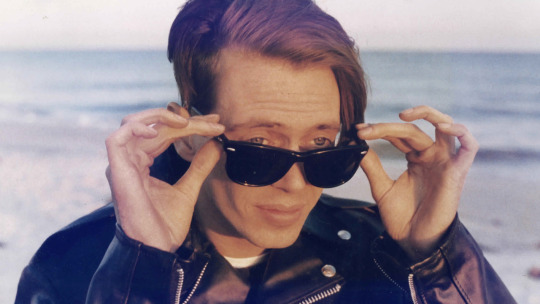
We all know the real right answer is: “Straight men are jerks. Gay men are jerks. Straight women are jerks. That leaves lesbians and they are off in their ivory towers laughing their heads off at the rest of us. I should’ve been a dyke”
But I am going to go for the more serious:
“...look at the others, waiting, wondering if some innocent moment of pleasure long past can set them up with the ultimate form of [German word my subtitles did not state]... I’d like to stage a piece in which all of the performers are people who are terminally ill, can you imagine the intensity, the concentration, the purpose”
This is said off-handedly in a conversation between Joan and a heterosexual male artist who was attending the party. I put it here for two reasons: a) the first half is a very succinct commentary on the state of the queer community (at least who were at the party) and feels like general commentary about the movie’s premise as a whole. Especially because Nick talks about how he didn’t realize how long the gestation period of HIV was, and by the time he started taking protective measures it was already too late. b) because the second half is just the most pretentious, absolutely mindless, careless, and shitty thing to say to someone who is actively losing a friend to a terminal illness. This fucking hetero artist came in to a room full of queer people and decided that dying people would be great to put in to his next project for ~The Vibes~ and I love that comment so much because first, it shows how much he Does Not Get It, and second because of how much disgust is baked in to Joan’s “Excuse me” as she leaves before he can finish his thought.
Because to say that to someone who is watching loved one after loved one after loved one die before their eyes is an absolutely disgusting thing to do (in my opinion).
Final Score
8/10
Up next, Philadelphia (1993)
#bengiyo queer cinema syllabus#queer cinema syllabus#parting glances#parting glances the movie#parting glances (1986)#unit 4: heartbreak alley
27 notes
·
View notes
Text
Bengiyo Queer Cinema Syllabus
Hello! After a holiday hiatus, I am returning to @bengiyo’s queer cinema syllabus. We will be ringing in the new year with Unit 4: Heartbreak Alley, the totally light-hearted, definitely not agonizing section of the syllabus where I get to watch countless acts of violence be committed against queer people. That fuck I have Lesbians waiting for me at the end of this unit. The films in Unit 4 are: Bent (1997), Strange Fruit (2004), Boys Don’t Cry (1999), Brokeback Mountain (2005), Parting Glances (1986), Philadelphia (1993), The Living End (1992), Holding the Man (2015), Jeffery (1995), and Boys on the SIde (1995)
Today I will be writing about
Boy’s Don’t Cry (1999) dir. Kimberly Pierce

Content Warning: rape, murder, self harm
[Run Time- 1:58, Lang: English] [I was not able to find Strange Fruit anywhere online so will investigate my library to see if they have a copy]
Summary: A young man named Brandon Teena navigates love, life, and being transgender in rural Nebraska.
Cast:
*Hilary Swank as Brandon Teena
*Chloe Sevigny as Lana Tisdel
*Peter Sarsgaard as John Lotter
*Brendan Sexton III as Tom Nissen
*Alicia Goranson as Candace
Side note: Boys Don’t Cry is based on the true story, and real life rape and murder of Brandon Teena, who was 21 years old when he was killed in Fall River, Nebraska.
__
To start, I’m glad that I looked this film up before I watched it so that I knew what to expect. I don’t know how often this will occur throughout the syllabus, but while the syllabus itself is a lead in to BLs it seems to be structured towards Baby Gays, which means that I am expanding my knowledge of famous trans people in history beyond Stonewall. I didn’t know who Brandon Teena was until I looked up this movie, I didn’t see his name printed in anything until I read Transgender History.
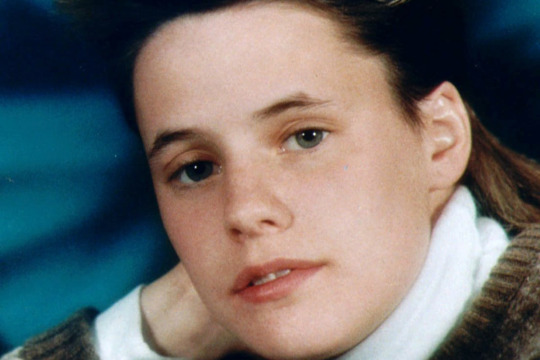
I am having a delayed reaction to this movie. While I was watching it, I was able to bear witness to the violence, it was graphic, and brutal, but I knew it was coming, I had time to prepare myself, I could abstract the violence being done in to a fictional character, I could remind myself it was a movie when the cameras panned away from the dead bodies and I could see the supposed corpses breathing. And then it was over and I couldn’t escape it anymore. I couldn’t escape the knowledge that this was real, that this actually happened, that what I had just watched, what I was not spared from, was bearing witness to an actual crime, to actual violence, rape, murder of an actual, real human being, of Family.
I said this in my last post from Heartbreak Alley that I went in to this section just expecting to be put through the wringer for almost the entire length of a film. I would say I went in to this unit expecting to feel my skin crawling the way it did with Mysterious Skin. Instead I have been gifted all sides of queerness: acceptance, homophobia, love, hatred, joy, pain, gentleness, violence. I want to talk for a bit about how grateful I was to see Brandon happy. His experience in this film does speak to truth, to trans experience, the complexity of being loved by a family member but not having your identity respected. Brandon’s cousin cuts his hair short for him, but can’t call him a man. Brandon gets in a bar fight and is beaming afterwards cause he got a shiner, cause random strangers didn’t clock him as trans. Brandon stays in Fall River for far longer than he should because he is riding the high of just getting to exist as himself. I know a number of friends who wanted to immediately get the hell out of dodge when they started their transition. Hell, I barely return home myself.
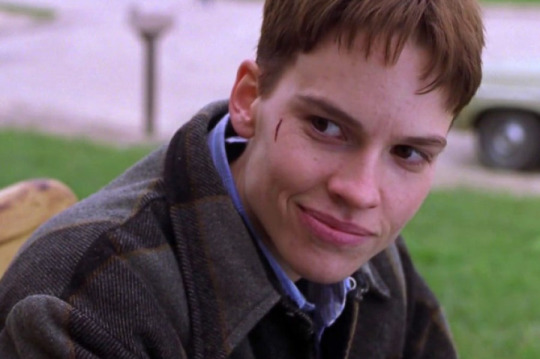
Brandon does stupid boy things, he flirts with every pretty girl, he pushes his own boundaries because he wants to prove that he is a man. He smiles. He smiles often. He smiles widely. He smiles. I loved how much he smiled in this movie. I love that his life was not all suffering. This movie is kind to Brandon while still having to put him through the inevitable.
This movie speaks to queer strength and queer fears, Brandon knew the people who raped and murdered him. They were his friends, he was their friend. They smoked together, drank beer together, and tried to dodge cops together. John (the man who will go on to murder Brandon) was one of the first people we saw affirm Brandon’s gender identity (at least in the movie). And I think this movie is smart in how they set John and Tom up. They are friendly but they are wild, we learn that John has issues with impulse control, we see how quickly John and Tom can escalate their behavior towards aggression.

Lana serves a reminder to trans people that we are worthy of being loved, and that there are people who will love us. I love what it says about Lana when she notices Brandon’s breasts during their first sexual encounter. When they finish she feels his lap, searching for a dick, she strokes his cheek and comments on how smooth his face is, she calls him handsome. For me this is where I think Lana figures it out, even if she isn’t told until later.
Lana (and later on Candace) serve as reminders to me that rural doesn’t mean bigoted. It can. It absolutely can. But there are queer people everywhere, there are allies everywhere, queer people can have a life, find love, experience joy anywhere. When Brandon returns to Lincoln for his court date, his cousin Lonny asks him “Fall River? You know they hang faggots there,” and that could be true. Fall River had people like John and Tom, it also had people like Lana, Candace, and the nurse.
[CW: the next few paragraphs will discuss sexual assault]
I loved that Lana was committed to Brandon as a person, she did not care what his body looked like. I loved that she refused to participate in Brandon’s humiliation. When John and Tom forcibly stripped him and tried to show Lana his vulva, she refused to look. It’s Brandon’s business, she loves Brandon, she doesn’t care, she will ease as much pain and humiliation as she possibly can.

The rape scene was brutual and hard to watch, especially because they don’t start it right away. Brandon is being interrogated, you get the implication, and while I was writing notes to myself I was just about to write “i’m glad they spared us the scene” when they cut to Brandon’s rape sequence. I sometimes struggle with displayed assaulted scenes, especially when they are associated with real people, because I think it is important to really, fully understand the violence that was committed against Brandon. I think the brutality he was treated with is very much an important thing to sit with and understand, and I am not one to feel like people should turn away from observing acts of violence. But I also don’t know that I love watching the assault of a man who actually existed who was really beaten and gang raped, I don’t think we have any way of knowing if he’d want to show that. I don’t think we have any way of knowing if that honors his memory.
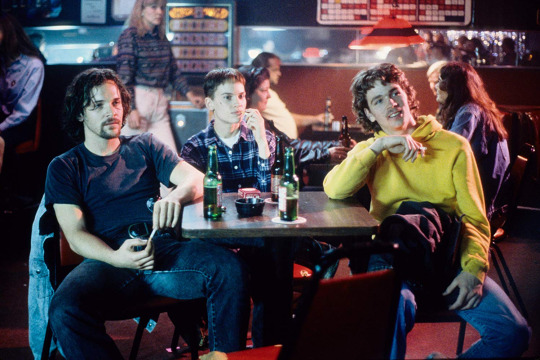
Either way, I did find it absolutely fascinating from a characterization standpoint what happened after Brandon was raped. Because before they get confirmation that Brandon is trans, they are using Brandon’s name and pronouns, then they get the confirmation and partway through they switch to Brandon’s deadname and misgender him. When they rape him, they misgender him. When he’s raped we see him getting thrown around, slammed against the car, punched in the face, etc. he is treated with such violence, and then it is over and Tom and John and Brandon kinda go back to normal? They gently place his shirt over his torso, they call him buddy, they help him stand up, they help him get in to the car, they ask Brandon if he is okay.
They take Brandon home, and immediately go back to affirming his identity. Like Brandon is in the bathroom, trying not to hold back or quiet down his breakdown, and John and Tom refer to him as ‘little dude’ when they start asking him if he is okay and if he will need any help. Like???? I feel like I will need to sit in that scene for a while trying to pick apart what John and Tom’s brains are doing there. Don’t get me wrong, the less I have to hear Brandon be deadnamed or misgendered the better, but it was truly a wild thing to see Brandon’s cousin deadname and misgender him all the time while still caring about and loving him, and to see Brandon’s assaulters and future murderers just slip so easily back in to masculine terminology for Brandon in this scene.
[Assault conversation over]
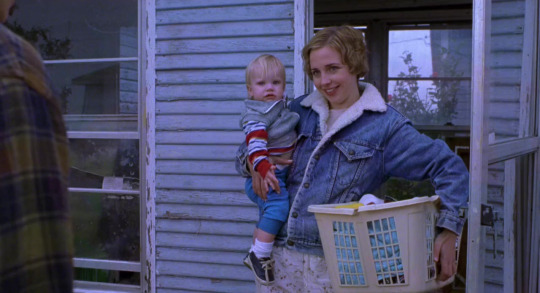
We get a similar thing with Candace where she is the first person to figure out that Brandon is trans, and she is horrified. But when Brandon comes a-knocking on her door, at first Candance cannot even meet his eye but she still uses his name, and the second she picks up on the fact that something is wrong with the way his voice wavers, she faces him, she softens, she asks him what they did to him, and she lets him back in to her home, she tries to hide him to keep him safe long enough to get out of town.
And Brandon gets another moment of peace, he and Lana have sex with Lana knowing everything about him. Knowing that he lied about his life, knowing that he has a vagina. They have another moment alone to dream, to talk about leaving Fall River, to plan to run away together. I don’t know if any of that happened in real life, but the movie at least grants Brandon one more moment of joy before his entire life is ripped away from him.

And it happens so fast. Candace is shot and killed instantaneously. Branon is shot in the head and he dies instantaneously, and John stabs him to make sure he’s finished the job, but in an instant, with the pull of a trigger Brandon is just…gone. Twenty-one years old, a whole life ahead of him. I think movies too often grant its characters a dying monologue. They get to have a final moment before they finally, slowly succumb to their injuries. But not here. Brandon is alive one second, and dead the next. There is no moment for silence right after, there is no remorse with John or Tom, they turn against Lana, they turn against each other. They are firing bullets at random, John is stopping Tom from killing Lana or Candace’s toddler.
I’ll tell you what though, sometimes the parallels parallel. Two days ago, my friend and I learned of the death of someone we cared about and loved, it’s a devastating loss for our household, and a devastating loss for the broader community. As far as I know, they did not die from any violent action, but they were a part of an incredibly stigmatized and disregarded community. The last few people who have passed away in my life died slowly, I was able to brace for it, but this was quick, unexpected and I say this only because seeing Brandon die so quickly, knowing he was real, knowing he had so much time taken from him, that knowledge just wrapped itself right around the rest of my grief for the week. I had a delayed emotional reaction to this movie, it took a couple minutes of silence afterwards to feel the blow, but I think having watched this when I did, Brandon Teena’s story will live in a different, deeper part of me than most of the films I’ve watched so far.
Favorite Moment

There isn’t one scene that really stands out to me, cause everything was so strong. I feel like my favorite moment is maybe right at the beginning when Brandon looks in the mirror after his haircut and sees himself and you can just see the happiness take root in his body.
Favorite Quote
“You’re so handsome”
Lana says this after she and Brandon have sex for the first time. I talked about it a bit above, but I think she figured out that Brandon was trans here, and I see her calling him handsome as affirmation.
Final Score
9/10
This was a fantastic film with incredible acting.
#bengiyo queer cinema syllabus#queer cinema syllabus#boys don't cry#boys don't cry (1999)#brandon teena#unit 4: heartbreak alley#apologies for skipping Strange Fruit y'all I went to watch it and I can't find it online so I will need to scour the library for a copy#i do hope I will be able to watch it#wka long post
30 notes
·
View notes
Text
Bengiyo's Queer Cinema Syllabus
Had a busy couple weeks, but here I am, returning to @bengiyo’s queer cinema syllabus. I am currently working my way through Unit 4: Heartbreak Alley, the totally light-hearted, definitely not agonizing section of the syllabus where I get to watch countless acts of violence be committed against queer people. Thank fuck I have Lesbians waiting for me at the end of this unit. The films in Unit 4 are: Bent (1997), Strange Fruit (2004), Boys Don’t Cry (1999), Brokeback Mountain (2005), Parting Glances (1986), Philadelphia (1993), The Living End (1992), Holding the Man (2015), Jeffery (1995), and Boys on the Side (1995).
Today I will be writing about
Strange Fruit (2004) dir. Kyle Schickner

[Run Time: 88 min, Available: had to purchase a DVD, Language: English]
Content Warning: lynching, racism, homophobia, rape, violence/gore
Summary: A New York attorney must return home to Louisiana to investigate the death of a childhood friend who, like Boyals himself, was both black and gay.
Cast:
Kyle Faulcon as William Boyals
Berlinda Tolbert as Emma Ayers
__
Well.
First of all, I guess, a thank you to @bengiyo is in order for discovering that Strange Fruit was available on DVD so that I was actually able to watch it. This has joined the likes of Mysterious Skin on my ‘definitely something I needed to watch, but can probably never watch again” list.
I want to warn anyone that is considering finding this film and watching it that it starts with a lynching. I…. I’m not sure I have the words. Not to get too real on main, but I have some pretty major trauma related to hangings, and I am just desperately glad that I did not watch this last week, as that was the anniversary and I am not confident I would have been able to finish this film. As it is I have been sitting in complete and utter silence since finishing the movie because a) holy shit b) the rope burns on his neck c) holy shit.
How do you watch a film like this knowing that lynchings still happen all the time? How do you watch a film where a gay Black man in a small, rural country town is brutally beaten, raped with a branch, and hung from a tree on screen while knowing that just last week a Black man was found hanging from a tree in a small, rural country town? For a movie that was filmed on a budget of only $250,000 (according to Wikipedia, the director was offered 6 million if he didn’t make the lead character both Black and gay and he turned it down) it is absolutely packed with very important, nuanced social commentary around queerness, around race, around homophobia in general and homophobia within the Black community specifically, around how the police uphold power, around the relationship between intellectualism and the South, and around how the queer community survives.

(sorry for the abysmal photo quality, there are no photos of this film and I watched it on my TV so I was not able to take screen shots)
For as cheaply as it was made it packs a motherfucking punch let me tell you, watching Kelvin scream for help, call for his mother, was just gut wrenching. Watching William desperately plead with the Black men who were lynching him not to do so because they were perpetuating the cycle of violence done by white men to black men not that long ago. How some Black men were fine with that because Kelvin, because William were faggots. How others killed themselves when the dust settled, understanding the realities of what they had done. The speech at the grocery story between Mrs. Ayers and Mrs. Boyals about how desperately Mrs. Ayers had wanted to disown Kelvin for being gay and how grateful she was that she hadn’t because she lost Kelvin too young.
The way small town loyalties and small town fears intersect, Matthew being so grateful that William protected him all the way back in fifth grade that he went against the orders of the other cops to tell William everything he knew, and how he was so afraid to be considered a homosexual if he stood up for a queer man. The way Sheriff Jensey was a racist, homophobic piece of flaming dog shit who still was doing everything he could to prevent people from knowing his nephew was gay. How he was reduced to ground meat for it. (Though, he can die, I have no remorse for him whatsoever). The way Mrs. Ayers calls out the fact that William can pass as straight but Kelvin couldn’t. The way that the queer community was silent in the wake of Kelvin’s death because that was the only way to guarantee the survival of community pillars. The fact that there was no new coverage of Kelvin’s death that we could see, but when the white man was lynched, there were news trucks all over the place because someone in power was affected.
And perhaps my favorite example, Duane, who refuses to step foot in a gay bar for fear of looking gay when he first starts investigating his brother’s murder with William who is ready to throw hands at Sheriff Jensey’s nephew when he makes a homophobic comment, putting his parole at risk, who ends the film driving around in William’s rental car which has the word Faggot spray painted on the back. The way he was angry at William for the stupid, elitist shit he was saying, about how everyone in Louisiana had an IQ below 80, how he refused to call this place his home anymore. Duance handled those moments so beautifully. There are so many important scenes in this film, I don’t think I can count this one as my favorite, but I do need to acknowledge how happy I was that Strange Fruit let a Black man cry on screen. Like, so much of Kelvin’s murder, and William’s attempted murder was incredibly upsetting, but I felt very deep in my soul the pain, the grief, the nausea that Duane must have been feeling looking at the memorial to his brother at his murder site.
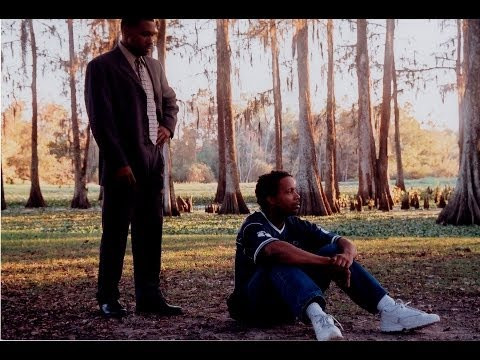
I know because (again to get too real) for every day for months after my hanging related trauma I had to walk past a memorial for the person who passed, and let me tell you that shit was fucking brutal.
There is so much more that could be said about this movie, but genuinely, I cannot find the words. The production team knew what they were doing when they didn’t put a backing track on the end credits, opting for a silence that was interrupted by only the chirping of crickets. Because that is what this movie is, that is what this movie does. I am not exaggerating when I say that the only thing I could do for thirty minutes after the screen went to black, was just sit on my couch, frozen, and feel the weight of the silence around me.
Favorite Moment
I talked about this a bit above but my favorite moment in Strange Fruit is when Mrs. Ayers and Mrs. Boyals run in to each other in the supermarket and Mrs. Ayers gives a very passive aggressively polite talking to to Mrs. Boyals about her homophobia, trying to get her to go back on her decision to disown William after finding out he was gay. I do think it is vitally important that we get a scene where a mother of a queer son, who just lost her child because of it, is able to admit that she struggled with his sexuality, that she desperately wanted to be rid of Kelvin, that she desperately wanted to forget he even existed. The way she was spared from having a major regret in her life because she ultimately did not do that. She lost Kelvin when he was too young, she understands at a cellular level the precious nature of time, and how easily it can be squandered and she is trying to spare Mrs. Boyals from that pain. I appreciate it strikes enough of a chord with Mrs. Boyals that she attempts to visit William at the hospital, even if ultimately she is not able to make it through the doorway to his room.
Favorite Quote
“See that’s the thing about the bayou, no matter how much you try to push it back ‘ventually it’s gonna claim what belong to it. This is where you from man. This is where home is. Don’t matter how many degrees you got, you country.”
As a Southerner who did flee North, Duane’s words are still ring true. Even when my home state wants to dispose of people like me, even when states I have called home express their hatred of people like me, there is still a part of me that feels the emptiness of being away from home. I miss the mangroves, I miss the mountains, I miss the food, I miss the people I love who love me. It feels impossible to have the type of community I had back home up where I am now, and I am trying as hard as I can to cultivate it. I just love this line so much because I think it is important to remember where you came from, especially because William just before this was insulting the intelligence of people in the South, his people, from his home. I’m really glad he apologized for that.
Score
8.5/10
If this was a grade based on just emotional manipulation, the film would get a 10 cause...fuck. But structurally I think it's probably like a 7 or an 8 so I am gonna give it an 8.5.
#bengiyo queer cinema syllabus#bengiyo queer media syllabus#queer cinema syllabus#strange fruit#strange fruit (2004)#strange fruit the movie#unit 4: heartbreak alley
22 notes
·
View notes